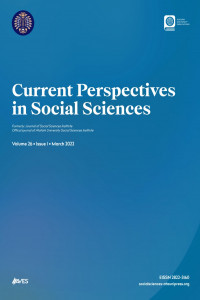Determinants of Success in International Mediation: Evidence From Cyprus and Northern Ireland Mediation Cases
This article systematically analyzes mediation attempts of George Mitchell in Northern Ireland and Kofi Annan in Cyprus, a success and a failure of international mediation, respectively. Based on data collected through interviews in Northern Ireland and Cyprus as well as secondary resources, this comparative case study tests the explanatory power of the Contingency Model of Mediation. The analysis shows that the variables in the model are insufficient in explaining the outcome for these two cases. Additional context variables such as international pressure, informal peace initiatives, and language and additional process variables such as nature of the peace talks and role of the leaders have stronger explanatory power in determining the outcome.
Anahtar Kelimeler:
Contingency model mediation, Cyprus, international mediation, Northern Ireland
___
- Bercovitch, J. (1984). Social Conflict and Third Parties: Strategies of Conflict Resolution. Westview.
- Bercovitch, J., Anagnoson, J. T., & Wille, D. (1991). Some Conceptual Issues and Emprical Trends in the Study of Successful Mediation in International Relations. Journal of Peace Research, 28(1), 7-17. [Crossref]
- Bercovitch, J. & Houston, A. L. (2000). Why Do They Like It Like This? An Analysis of the Factors Influencing Mediation Behavior in International Conflicts. Journal of Conflict Resolution, 44(2), 170-202. [Crossref]
- Burton, J. W. (1969). Conflict and Communication: The Use of Controlled Communication in International Relations. MacMillan.
- Cameron Report. (1969). Disturbances in Northern Ireland. Retrieved 2020, https://cain.ulster.ac.uk/hmso/cameron.htm.
- Coogan, T. P. (1996). The Troubles: Ireland’s Ordeal 1966-1996 and the Search for Peace. Arrow Books.
- Cunningham, W. G. Jr. (2006). Terrorism and Conflict Resolution: Theory and Practice. (Unpublished Dissertation), George Mason University.
- Darby, J. (1995). Conflict in Northern Ireland: A Background Essay. In S. Dunn (Ed), Facets of the Conflict in Northern Ireland, Macmillan Press. [Crossref]
- Darby, J. (1997). Scorpions in Bottle: The Case of Northern Ireland. Minority Rights Group: London.
- Doob, L. W. (1993) Intervention: Guides and Perils. Yale University Press. [Crossref]
- Druckman, D. (2005). Doing Research: Methods of Inquiry for Conflict Analysis. Sage Publications. [Crossref]
- Dryzek, J. S. & Hunter, S. (1987). Environmental Mediation for International Problems. International Studies Quarterly, 31, 87-102. [Crossref]
- Fisher, R. J. & Keashly, L. (1988). Distinguishing Third Party Interventions in Intergroup Conflict: Consultation is not Mediation. Negotiation Journal, 4(4), 381-393. [Crossref]
- Fisher, R. J. (2001). Cyprus: The Failure of Mediation and the Escalation of an Identity-Based Conflict to an Adversarial Impasse. Journal of Peace Research, 38(3), 307-326. [Crossref]
- Fitzduff, M. (2002). Conflict Resolution Process in Northern Ireland. United Nations University Press.
- Folberg, J. & Taylor, A. (1984) Mediation. Jossey Bass.
- Freedom House, Freedom in the World 2004, https://freedomhouse.org/sites/default/files/202002/Freedom_in_the_World_2004_complete_book.pdf.
- Global Firepower, Comparison of Turkey and Greece Military Strengthens, Retrieved 2020, https://www.globalfirepower.com/countries-comparison-detail.php?country1=turkey&country2=greece
- Başlangıç: 2003
- Yayıncı: Atatürk Üniversitesi
Sayıdaki Diğer Makaleler
Bayburtlu Zihni’nin “Çarpışır” Redifli Gazelinin Modern Yöntemlerle İncelemesi
Kızıldere Definesi’ndeki Antoninler Dönemi İmparatoriçe Sikkelerinin Tipolojik İncelemesi
Fatih GÜRBÜZ, Ayberk BOSTAN SARIOĞLAN
HÜSN-I HAT VE CAMİ MİMARİSİNE KATKILARI
Bireylerin Kanser Hastalığına İlişkin Algıları
Asli KAYA, Erdal EKE, Gökhan ABA
Ben Aslında Yoktum: Sanatçının Tarihsel Serüveni
Döndü Tülay ÖZKUL, Ferhunde KÜÇÜKŞEN ÖNER
Göçmen Ergenlerde Otobiyografik Bellek Gelişimi ve Benlik Saygısı Üzerine Bir Derleme
